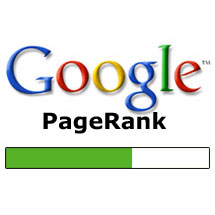The Top Two Factors In The Google Algorithm: A Clinical Approach
Posted on September 14, 2011 by CJ Article Team

I opened a medical website 11 years ago based on my own information leaflets for patients. Some of my webpages, themed on relatively low difficulty keywords, were regularly in #1 on Google. At various times, three of my webpages dropped from #1 to #2 for a few months. The question was “What did the pages that were now in #1 position have that my demoted, #2 pages, did not?”
From a clinical point of view, not one of the new #1 pages was as technically correct as my own. From an on-page search engine optimisation (SEO) point of view, they did not seem to be particularly impressive. Scoring checks with Website Auditor and Internet Business Promoter confirmed that my webpages had significantly better scores.
That left off-page optimisation – links from websites – as the other option to be checked. The new #1 webpages had one or two incoming links with minimal link value (SEO Spyglass) and PageRanks 0. Again, my pages had more link juice and PageRanks 1 or 2.
There was no obvious explanation for the new webpages achieving #1 position according to the literature. Here was a fascinating opportunity for research.
There was one common element to the three webpages that had pushed three of my #1 webpages to #2: They were all articles published by journalists in a variety of national newspapers’ websites. Whilst the PageRanks of the new #1 webpages were all 0, the Homepage PageRanks (HPR) ranged from 6 to 8. It became apparent that it was not the authorities of the individual webpages that were pushing mine down, but the authority of their respective websites as indicated by their HPRs.
Many SEO experts suggest that PageRank is irrelevant in SEO because there are many webpages with PR0 that are on the top page of Google for highly competitive keywords. Their observations were confirmed but all the internal web pages they were quoting with PR0 had HPRs 4 or more.
The PageRanks of the URLs of the top 10 webpages for numerous keywords and their corresponding HPRs were recorded on a spreadsheet. HPR was clearly the #1 factor as far as Google was concerned; however, it did not explain a few exceptions to the rule occurring with some medium difficulty keywords.
These exceptions to the rule became the next focus for attention. Most of these top page positioned webpages with PR0 for medium keyword difficulty were themselves Homepages.
Google has been all about “authority” as indicated by links from other websites and is clearly assuming that the HomePage of a website has that website’s greatest authority. The conclusion was that Google is providing a boost in effective PageRank to Homepages when they are competing for a keyword (the second factor in the Google algorithm – G-Factor 2).
It proved impossible to give a numerical value to this HPR boost by manual input into a spreadsheet – it was too time-consuming.
The first version of a program that finds the PageRank of the URLs and the corresponding HomePage PageRanks for a list of keywords on the top Google SERP was produced. The output could be transferred into a spreadsheet such as Excel for further analysis.
It became apparent that the boost to effective HPRs for HomePages competing for a keyword was between 4 and 5, but for HomePages with PageRanks of 5 or more, there was no discernable boost.
Confirming the top two factors on Google.
To test the validity of the top two factors as explained above, you can do a search on any keyword on Google with either Internet Explorer or Firefox with the Google toolbar active. Check the PR of any of the webpages on the top Google SERP and also the corresponding HomePage PageRank. If one of the top webpages is a HomePage with PR less than 5, add the G-Factor 2 boost so that the adjusted HPR becomes 5.
From a practical point of view, a newly indexed website has HPR0 for all the indexed pages. If the HomePage is appropriately optimised for a keyword, it will have a chance of reaching the top page on Google only if the averaged adjusted HomePage PageRank keyword difficulty (HPR-KD) for that keyword is 4.3 or less. HPR-KD for a keyword is calculated by averaging the HPRs, including the G-Factor 2 adjustment, of the webpages on the top Google SERP. Internal pages on a newly indexed website will not reach the top Google SERP for any useful keywords as their associated HPR is 0.
In time, as naturally acquired links from other websites are accumulated, the HPR of websites increase and keywords of ever-more difficult HPR-KD will come into play. It is crucial that websites should focus on keywords that are in range for top positioning on SERPs. This will allow the website to be found and for new links to be acquired. A website will receive more targeted traffic from the search engines if it is on the top SERPs for in range keywords with relatively little traffic than if it is invisible on the SERPs for keywords with more attractive traffic volumes.
The author is a clinician with 30 years of experience with computer applications for medical education.
David Viniker MD FRCOG is a doctor trained to practice evidence based medicine. He has applied the principles of evidence based practice to SEO. David believes that HomePage PageRank is the top factor in the Google positioning algorithm and that Google provides a boosting adjustment to HomePages that are competing for a keyword. He has developed a new, essential keyword tool - http://www.KeywordSEOPro.com which calculates keyword difficulty based on HomePage PageRank. His website http://www.firstwebsitedesign.com provides valuable information for beginners and intermediates in website design and search engine optimization.
Article Source: http://EzineArticles.com/?expert=David_Viniker
Facebook Comments:


































